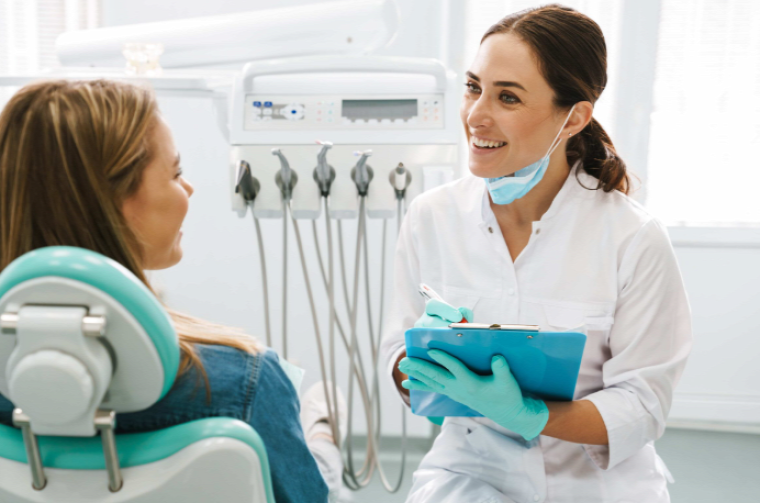Preparing for Your First Dental Appointment
Going to the dentist for the first time can feel a little intimidating, especially if you’re unsure about what to expect. Whether you’re a child visiting the dentist for the first time, or an adult who hasn’t been in years, understanding what happens during the initial visit can help ease any nervousness. Let’s walk through the key steps of a first dental appointment so you’ll feel prepared and confident.

Booking Your Appointment
The process starts with scheduling your visit. When you call or book online, the dental office will ask for some basic information. Be prepared to provide:
- Your personal details (name, age, contact information).
- Insurance information, if applicable.
- Any specific concerns or reasons for the visit, such as a toothache or regular cleaning.
If you’re bringing a child for their first visit, let the office know their age so they can make the experience fun and age-appropriate.
Completing Initial Paperwork
Once you arrive at the dental office, you’ll typically be asked to fill out some paperwork. This might include:
- Medical history: Your overall health can affect your oral health. You’ll need to list any medications, allergies, or medical conditions.
- Dental history: Information about past treatments or concerns, like tooth sensitivity or previous dental work.
- Consent forms: These give the dentist permission to examine and treat you.
It’s a good idea to arrive a little early to allow time to complete this paperwork.
A Friendly Welcome and Office Tour
Your first dental appointment is about building a relationship with your dentist and their team. Many offices start with a warm welcome and even a quick tour of the facility. This helps you feel more comfortable and familiar with the environment.
"Your comfort is as important as your dental health."
If you have any questions about the tools or procedures, don’t hesitate to ask. Dentists and their staff are happy to explain things and address any concerns.
The Initial Examination
The main part of your first visit is the dental exam. Here’s what usually happens:
- Meeting the Dentist: You’ll be introduced to your dentist, who will talk to you about your health and any concerns you might have.
- Visual Check: The dentist will look inside your mouth to examine your teeth, gums, and tongue. They’ll also check for signs of cavities, gum disease, or other issues.
- X-Rays: Most first appointments include dental X-rays. These help the dentist see problems that aren’t visible to the naked eye, such as issues with the roots, jawbone, or hidden cavities.
Cleaning Your Teeth
If time allows and your mouth is in good condition, your first appointment might also include a dental cleaning. This process involves:
- Scaling: Removing plaque and tartar buildup around your teeth and gumline.
- Polishing: Using a special paste to make your teeth smooth and shiny.
- Fluoride Treatment: In some cases, a fluoride varnish or rinse is applied to strengthen your teeth and prevent decay.
A dental hygienist often handles this part of the appointment, but the dentist may assist or check in.
Learning About Your Oral Health
After the examination and cleaning, the dentist will review their findings with you. They might discuss:
- Any issues they found, like cavities or gum inflammation.
- Recommendations for treatment, such as fillings or follow-up visits.
- Personalized tips for better oral care, like brushing techniques or dietary advice.
This is your chance to ask questions! Don’t hesitate to clarify anything you’re unsure about.
Addressing Dental Anxiety
Many people feel nervous about visiting the dentist, especially for the first time. It’s completely normal, and your dentist understands this. Here are a few ways they help ease anxiety:
- Gentle explanations of what’s happening at every step.
- Taking breaks during the appointment if you feel overwhelmed.
- Offering sedation options for particularly anxious patients (though this is more common in later treatments).
"Good communication with your dentist can turn fear into trust."
Creating a Treatment Plan
If your dentist finds any issues during the exam, they’ll work with you to create a treatment plan. This plan outlines:
- The procedures needed to restore your oral health, like fillings, crowns, or gum treatments.
- The timeline for completing these procedures.
- The estimated costs and insurance coverage, so you can plan accordingly.
Building Healthy Habits
Your first appointment isn’t just about fixing problems – it’s also about prevention. The dentist will guide you on how to maintain healthy teeth and gums at home. Expect tips on:
- How to brush and floss effectively.
- The best products for your specific needs, like toothpaste for sensitive teeth or electric toothbrushes.
- Lifestyle changes, such as reducing sugary snacks or quitting smoking.
A great dentist acts as a partner in your oral health journey.
Pediatric Dental Appointments
If it’s your child’s first visit, the experience may be a little different. Pediatric dentists use special techniques to make the visit fun and stress-free. They might:
- Use child-friendly language and playful explanations.
- Show kids the tools and let them "play dentist" to reduce fear.
- Offer small rewards like stickers or toys at the end of the visit.
For children, the goal is to create positive associations with the dentist early on.
Follow-Up Appointments
Your dentist will likely recommend scheduling follow-up visits every six months. Regular check-ups help prevent problems before they start and keep your smile in great shape. If you need additional treatments, your dentist will work with you to arrange them.
Common Myths About Dental Visits
There are a few misconceptions about going to the dentist that might make first-timers hesitant. Let’s clear them up:
- “It’s going to hurt!” Modern dentistry is far less painful than people expect. Numbing agents and gentle techniques minimize discomfort.
- “It’s too expensive.” Regular check-ups are more affordable than waiting until you need major treatment. Plus, insurance often covers preventive care.
- “I don’t need to go unless I’m in pain.” Dental issues often develop silently. Early detection prevents costly and painful problems later.
Tips to Prepare for Your Visit
To make your first dental appointment go smoothly, keep these tips in mind:
- Brush and floss your teeth before the appointment.
- Bring any necessary documents, like ID or insurance cards.
- Arrive a few minutes early to fill out paperwork.
- Write down any questions you’d like to ask your dentist.
The more prepared you are, the more confident you’ll feel.
What Happens After Your First Visit?
Once your first dental appointment is complete, you’ll have a better understanding of your oral health and what you can do to maintain it. You’ll also know what to expect during future visits, making the process less intimidating.
FAQs
1. How long does a first dental appointment usually take?
It typically lasts 45 minutes to an hour, depending on whether a cleaning is included.
2. Do I need dental X-rays during my first visit?
Most first appointments include X-rays to check for hidden issues.
3. How much does a first dental appointment cost?
The cost varies depending on your location and insurance. Many dental offices offer affordable packages for first-time patients.
4. What if I have a dental emergency before my scheduled appointment?
Contact the office immediately – most dentists accommodate urgent cases quickly.
Take the first step toward a healthier smile by booking your dental appointment today! Remember, your dentist is there to help, not judge. Your oral health journey starts with that very first visit!


